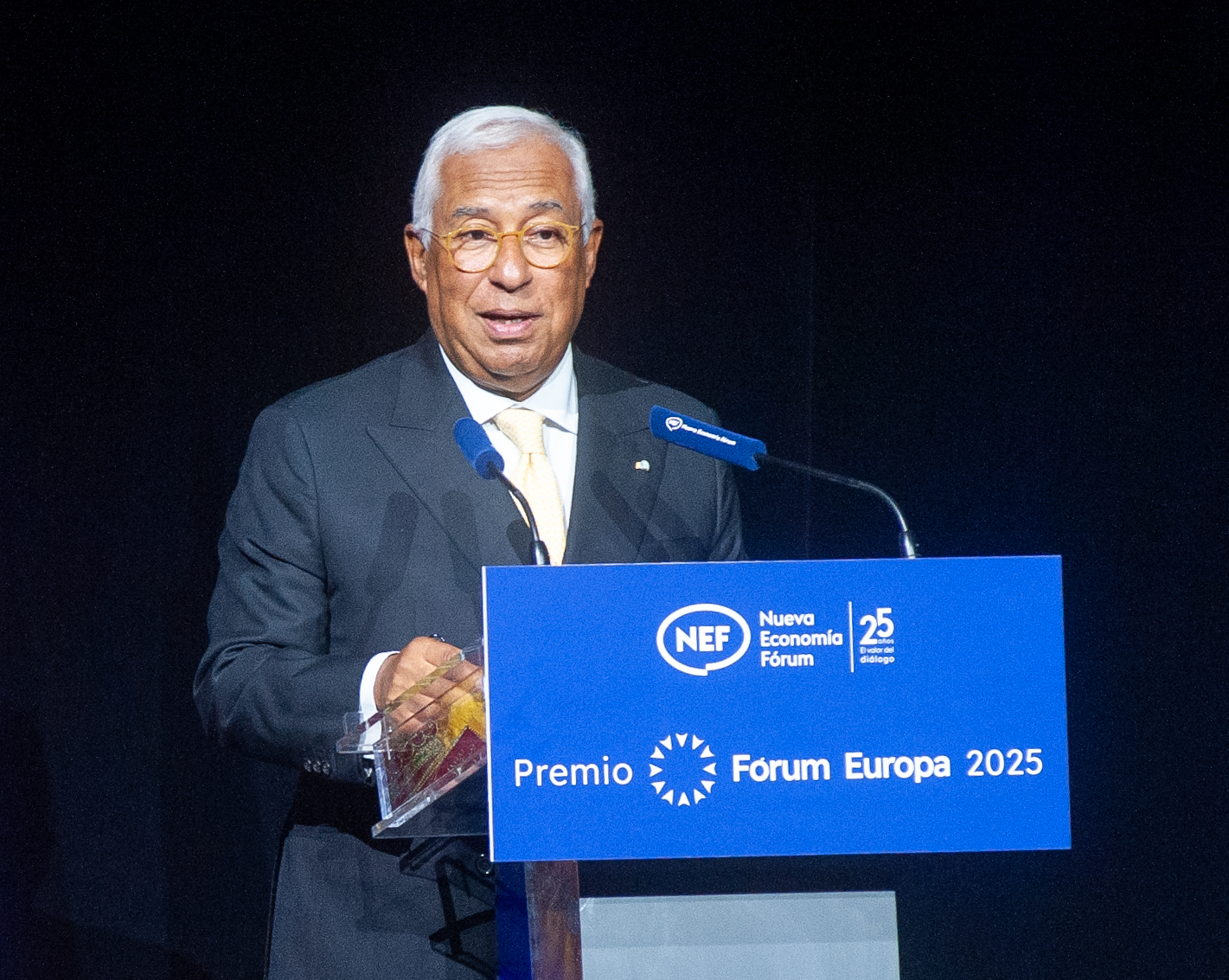H.E. Mr. António Costa, President of the European Council, was awarded the 2025 Forum Europa Prize by New Economy Forum in a ceremony presided over by the H.M. the King of Spain, the President of the Spanish Senate; the President of the Spanish Constitutional Court; the Second Vice-President of the Government of Spain and Minister for Work and Social Economy; and the Spanish Minister for Economy, Trade and Enterprise; at the Teatro Real in Madrid, Spain.
The full transcript of his acceptance speech is reproduced below:
It is a great honour for me to receive this award from such an important institution of a sibling country such as Spain, on such a symbolic date, with the Forum celebrating 25 years and Spain and Portugal celebrating 40 years of integration into the European Union.
In preparing this speech I was transported into the past, to my childhood, to my school classes, when the nationalism on which the dictatorship was based and the history of Portugal was summed up in two ideas: First, Portugal was a great imperial nation thanks to the immense Lusitanian genius that enabled us to discover the world. And second, the Portuguese heroism that had enabled us to resist the devil. To resist our great enemy: Spain.
The conquest of democracy not only freed us from a backward country that was trapped in an endless colonial war. It also freed us from this nationalist narrative that kept us with our back to Spain and isolated us from Europe and the world. It is difficult for our children and grandchildren to imagine the reality we lived through 50 years ago.
That is perhaps the greatest success of the voyage we are taking together on the ship of democracy and the European project. In a similar way, Magellan and Elcano embarked together on that expedition which, in a historic feat, would result in the first voyage around the world.
In short, that is what we did together, the Portuguese and the Spanish. We took Saramago’s stone raft, adrift on the ocean of history, and we took it together to the centre of European modernity. I, personally, feel enormously proud of having taken an active part in this adventure of bringing our two countries closer together, and of having worked hand in hand to strengthen this great project of the European Union.
I am extremely grateful to my Spanish colleagues, with whom I have worked closely, irrespective of political colour. During my long career and life I have been privileged to work closely with a mayor and a mayoress of Madrid, with ministers from the governments of José María Aznar and José Luis Rodríguez Zapatero, and, as Prime Minister, with Mariano Rajoy and Pedro Sánchez. Nothing better symbolises the closeness of relations between the Portuguese and the Spanish than His Majesty the King’s friendship towards Portugal and the Portuguese people’s affection for the Spanish royal family.
For the Portuguese, one of the greatest milestones in our integration into Europe was the opening of our borders with Spain. The ability to cross to the other side without showing a passport and without enduring long queues.
One of the most difficult decisions, to close the borders during the COVID-19 pandemic, was therefore a moment of shared pain. We were the only governments in Europe always to do so in a coordinated, and never unilateral, manner. That is why when we decided to reopen them, we wanted to mark the occasion by doing it together, in the most symbolic way possible, in Badajoz and Elvas, with the Prime Minister of Spain and myself, and with the President of the Republic of Portugal and His Majesty the King of Spain.
We have never had such a close political, economic and social relationship as we do now in this democratic era. Spanish companies, from banking to energy, have a very strong presence in Portugal, and trade between the two countries is stronger than ever. Much remains to be done, however. Europe’s border regions are generally the most developed regions. That is the case with Spain’s border with France.
We are an exception here, however, as illustrated by the problem of ‘emptied Spain’ and the emptiness of the Portuguese interior. The close connections of the Atlantic axis between Porto and Galicia can, and must, provide the inspiration to promote a cross-border development strategy that overturns that historical inheritance, the result of two countries turning their backs on each other for too long. The border regions with Castile-Leon and Extremadura offer an immense opportunity for the shared cross-border development of the Iberian peoples.
We now see it all very clearly, as if everything had been written in advance, happy ending included. But during our transitions to democracy we also lived through very difficult, very uncertain times. It was not easy. Neither the Portuguese revolution nor the Spanish transition. This was so well described by Javier Cercas in ‘The Anatomy of a Moment’, looking at that unique and dramatic day of 23 February 1981.
Neither could our democracies solve all of their problems at once, as some had hoped. That is one of the most important lessons life has taught me: Even when things go badly and do not turn out as expected, the important thing is to have a project and a clear direction. Five decades ago, in Portugal and Spain, we created a solid democratic project and we had a clear destination, which was to return to the centre of Europe.
The European Union is now our common project, that of Spain and of Portugal, but also of 25 other countries, and is the well-deserved aspiration of many others who want to join it. We saw this yesterday in the convincing pro-European victory in Moldova. Despite all the problems and disappointments we sometimes face, we must not lose sight of the fact that our shared objective must be to strengthen our Union further.
I understand the frustration at times. We always expect more, of course. But we could say that frustration is the sister of ambition, which, in turn, is the daughter of the inspiration that Europe awakens in us. We always want more, because Europe has always managed to surpass itself. However, despite the progress made, new difficulties arise, reminding us that we have still not reached the end of the road. It is that contradiction between the developing utopia and the difficulties of the moment that we have to face.
But in the end, we must ask ourselves two great questions:
First: Could we do it better separately? Would we be better off without the single market, without freedom of movement, without the euro? Would we have a better social model without Europe? Could we have greater negotiating capacity with the US or China if we were each negotiating alone? Could we be an indispensable ally in Ukraine’s fight for its sovereignty against Russia’s war of aggression? If we were operating separately, could we exert more influence to stop the unacceptable barbarism in Gaza?
To me the answer is obvious. No, we would not do it better separately.
The second great question: how can we keep making this project better? We cannot rest on our laurels. Europe must push forwards, transform itself, dare to look beyond. It must mobilise to restore the competitiveness of the European economy, strengthen our security, and assert itself in a multi-polar world.
In doing so we must be guided by three major principles: unity, solidarity and imagination. Unity, because only together can we be strong in a world of giants. Solidarity, because we cannot leave anyone behind. Imagination, because the future is not yet written, and we need courage and vision to build it. That is the way forward: a united, solidarity-based and imaginative Europe.
And for all this, Europe needs Spain. Because Spain is not only part of Europe. Spain is building Europe, every day. Always at the forefront, delivering dynamism, energy, ambition and diversity. It is an economic driver, spearheading the growth of the euro area over the past two years.
Spain has been at the vanguard. A reference point for rights. A role model for freedoms. A pioneer in the fight for equality. And it has also given shape to ideas that have transformed Europe: the concept of European citizenship, which offers so many benefits cohesion policy, which unites territories and reduces inequalities the Erasmus programme, which has changed the lives of generations of young people and the belief that Europe must always look towards Latin America, Africa and the entire Mediterranean
The world is changing rapidly: climate, technology, geopolitics. But we cannot let ourselves become incapacitated, overwhelmed by the speed of these changes. We have a unique instrument in history: our European Union. We must act. And we must do it now.
It is clear that our biggest ally to date, the United States, is changing a great deal. It is changing, and it is trying to change the order that emerged from the ruins of the second world war. That time gave birth to the European Union. It has cooperation, dialogue and multilateralism in its DNA. Democracy, equality and human rights are some of its key principles.
And we will not retreat from any of this. We hope that the United States will continue to be a great ally as we continue to defend our model. A commitment to multilateralism and a rules-based world order. To a fair and predictable global trading system. The European Union will continue to diversify its trade relations with Mercosur, with Mexico, with India, and with countless other partners.
We will continue to strengthen our ties with other countries and regional organisations such as the Community of Latin American and Caribbean States and the African Union, with each of which we will hold a summit in November. We will remain the world’s largest development aid donor and the UN’s greatest backer. To address the challenges of the climate emergency, inequality and the technological revolution.
We are not American or Russian or Chinese. We are European. And we are proud of that. But we often face very particular challenges because being Europeans means being diverse. The way we see the world differs depending on our points of view.
As a former High Representative, Josep Borrell is well aware that it is not always easy to take the same position on the world when we look at it from such different geographical perspectives. We are proud of our cultural diversity, our social model, our freedoms, our tolerance, and our democracy. And in this harsher and more dangerous new world which is now just coming into being, we must defend our model tooth and nail.
When our allies inspire less confidence and our adversaries increase their threats, we must be able to stand on our own two feet. If we want to be free and autonomous, we cannot be militarily dependent on other powers. If we want to have influence and make ourselves heard, for example in the Middle East, it will not be enough to uphold lofty principles, issue statements, or wield our economic power.
That is why we are increasing our investments in defence. Because peace without defence is an illusion. Because soft power alone is not enough in a world where hard power increasingly prevails.
As an Iberian, I know it can seem to all of us that the war in Ukraine is a far-off, foreign conflict, as though the Russian threat does not concern us as much as it does the countries in eastern Europe. Let me tell you a story, because life takes many twists and turns. I have a clear memory of how, in meetings of the Council of Ministers for Justice and Home Affairs in 2005, my dear friend Alfredo Pérez Rubalcaba fought to appeal to European solidarity following the storming of the fences in Ceuta and Melilla.
To the countries of northern and eastern Europe, this was a far-off concern back then in 2005. Migrations and small boats were an issue for the south. Only Portugal and the other southern countries gave Alfredo their unstinting support.
Now, 20 years on, nobody disputes that migration is one of the biggest challenges that Europe is facing. In fact it is the Nordic countries and our friends and partners in the east who talk most about the issue of migrations. Even those who said at the time that it was only a southern issue. For me, the more progress is made in European integration, the fewer problems there are that are ‘northern’ or ‘southern’, ‘eastern’ or ‘western’. It is just a matter of time. These are all European challenges. Because we are one single European Union.
My friends, I will conclude now. I hope I haven’t bored you too much. Or just a little. I began my speech by talking about what I was told while sitting at my desk at school in Lisbon, and ended by talking about global geopolitics. Unfortunately, I don’t have all the answers, however much I would like to. I wish I did. However, what I do have is the certainty that what I learned about the vital relationship between Spain and Portugal reaches beyond our beloved Iberia.
That borders are lines drawn by people on a map, and that it is within our own power to turn these lines into ties of cooperation. Ties of kinship.
Looking back, that is what I have dedicated much of my life to, and what I will continue to do. I am therefore truly grateful for this award, if it also serves to recognise this noble endeavour.
Peace, prosperity and freedom for all. Long live Europe.
Thank you very much.












